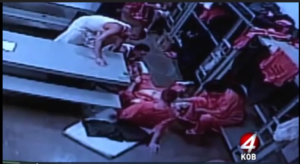Doug Edmisten was a ‘burly’ man, fifty years old, and a veteran of the United States Army. He drove a motorcycle and made a living building sheds. A simple man, it seems, not a man of a lot of means. He did have a couple open warrants, though, for DWI and leaving the scene of an accident in which no one was injured.
His open warrants got him arrested in New Mexico. After his arrest he was placed in the Cibola County Detention Center to await a trial.
The pictures of the pod he was housed in show bunks lining the walls, one against the other, cement floors, and picnic table looking furniture. That’s where he lived for about three weeks before he died.
 Doug, the man who served our country in the Army, became ill. As they should have, the men living with him reported that he wasn’t feeling well.
Doug, the man who served our country in the Army, became ill. As they should have, the men living with him reported that he wasn’t feeling well.
That was at 10:14 p.m. At that time, an employee recorded that Doug was ‘notably pale’ and his ‘skin also appeared yellow’. He reported to the staff that he had vomited blood. I am not a medical professional, but common sense tells me vomiting blood is a medical emergency. If I were to witness someone vomiting blood, I would be concerned their life was in danger. I did an internet search to see if I was unique. ‘Is vomiting blood a medical emergency’ was what I searched. Without exception – the results all reported that vomiting blood is a medical emergency.
Doug was taken to medical at 10:54. While he was there his pulse was recorded at 144 beats per minute. If the pulse did not concern the medical staff, Mr. Edmisten also vomited blood while he was in medical.
It was determined he should be sent back to his cell. He was unable to walk there by himself, so he was held up by two guards.
 The men he lived with were much more compassionate than the staff at the Cibola County Detention Center. They not only pleaded for help for their cellmate, they also can be seen in video footage holding hands and conducting a prayer circle for him. They can be seen trying to soften his fall when he rolled from his bed. They are seen cradling his head and holding a bible. The inmates tended to Doug Edmisten with compassion and care with all they had at their disposal, which was prayer and an offer of comfort.
The men he lived with were much more compassionate than the staff at the Cibola County Detention Center. They not only pleaded for help for their cellmate, they also can be seen in video footage holding hands and conducting a prayer circle for him. They can be seen trying to soften his fall when he rolled from his bed. They are seen cradling his head and holding a bible. The inmates tended to Doug Edmisten with compassion and care with all they had at their disposal, which was prayer and an offer of comfort.
It was 3:32 when prisoners reported that his condition had actually worsened. If vomiting blood was a medical emergency, Doug was beyond that. His ‘eyes were rolling back’. When a medical professional, someone whose job it is to care for the inmates housed at the jail, arrived, she saw Doug on a toilet, defecating blood. A decision was made to wheel him back to medical. At this point, he was unresponsive.
What I would have seen as a man dying, was dismissed, and Doug was taken back to his cell after fifteen minutes.
At 4:21 a.m. a guard found Doug on the floor. His head was on the lap of a fellow inmate. Another man was reading from a Bible. The guard left.
It is reported that the inmates told staff at 4:58 that Doug was no longer breathing. He was determined to be dead by a staff member.
State police were called at 5:07 a.m.
At 5:26 a staff member checked Edmisten and detected a slight pulse.
Emergency services were finally called, about seven hours after Doug’s cellmates first reported that he was ill. Doug Edmisten was dead when help finally arrived.
Doug, an Army vet, a United States citizen, a burly man who built sheds and rode a motorcycle, was in jail awaiting a court date for a DWI, and the staff at the jail allowed him to die under their care, as his fellow cellmates cradled his body, pleaded for help, and formed a prayer circle.
RESOURCES
Swenson, Kyle. “Lawsuit Alleges New Mexico Jailers Let Inmate Awaiting DWI Court Date Bleed to Death.” The Washington Post. WP Company, 12 July 2017. Web. 23 July 2017.
![]()